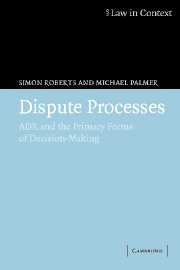Book contents
- Frontmatter
- Contents
- Preface
- Acknowledgements
- 1 Introduction
- 2 Cultures of Decision-making: Precursors to the Emergence of ADR
- 3 The Debates Around Civil Justice and the Movement Towards Procedural Innovation
- 4 Disputes and Dispute Processes
- 5 Negotiations
- 6 Mediation
- 7 Umpiring
- 8 Hybrid Forms and Processual Experimentation
- 9 The Trajectory of Alternative Dispute Resolution
- Bibliography
- Index
8 - Hybrid Forms and Processual Experimentation
Published online by Cambridge University Press: 05 June 2012
- Frontmatter
- Contents
- Preface
- Acknowledgements
- 1 Introduction
- 2 Cultures of Decision-making: Precursors to the Emergence of ADR
- 3 The Debates Around Civil Justice and the Movement Towards Procedural Innovation
- 4 Disputes and Dispute Processes
- 5 Negotiations
- 6 Mediation
- 7 Umpiring
- 8 Hybrid Forms and Processual Experimentation
- 9 The Trajectory of Alternative Dispute Resolution
- Bibliography
- Index
Summary
Introduction
In identifying three primary processes of decision-making – negotiation, mediation and umpiring – we have tried to give these modes an analytical clarity that is not necessarily going to be revealed so sharply in real-life forms. At the same time we have left largely unexamined the relationships prevailing between these different processes, and the relative value attached to them, where they are found together in a particular culture. But we have already noted, in Chapter Five, how negotiations are routinely pursued through litigation in the common law world, as a result of the unwillingness of lawyers to contemplate the construction of an agreed resolution to a dispute without mobilisation of the court process. So bilateral processes may take place along the route towards the court. We also saw how judges may depart from an adjudicatory procedure, abandoning a binary, win-or-lose approach to decision-making in favour of encouraging the parties to construct their own solutions. In some jurisdictions, the role of the judge may be seen as one in which mediation is stressed, and adjudication to be relied on to secure an outcome only as a final and unwelcome last resort (see the example of contemporary China: Palmer, 1989). Moreover, as Gulliver has observed, the role of mediator in some cultures is conceptualised and practised in directive, almost ‘umpire-like terms’ (1979: 225–226).
- Type
- Chapter
- Information
- Dispute ProcessesADR and the Primary Forms of Decision-Making, pp. 277 - 358Publisher: Cambridge University PressPrint publication year: 2005

